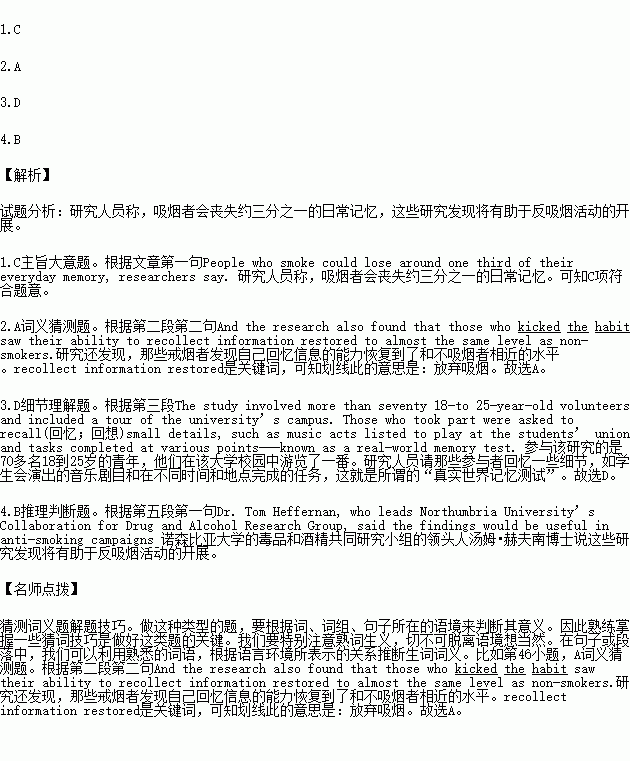题目内容
People who smoke could lose around one third of their everyday memory, researchers say.
A study by a team at the University of Northumbria has shown that smokers lose more of their memory when compared to non-smokers. And the research also found that those who kicked the habit saw their ability to recollect information restored to almost the same level as non-smokers.
The study involved more than seventy 18-to 25-year-old volunteers and included a tour of the university’s campus. Those who took part were asked to recall(回忆;回想)small details, such as music acts listed to play at the students’ union and tasks completed at various points---known as a real-world memory test.
Smokers performed badly, remembering just 59 percent of tasks. But those who had given up smoking remembered 74 percent and those who had never smoked recalled 81 percent of tasks.
Dr. Tom Heffernan, who leads Northumbria University’s Collaboration for Drug and Alcohol Research Group, said the findings would be useful in anti-smoking campaigns. He said, “Given that there are up to 10 million smokers in the UK and as many as 45 million in America, it’s important to understand the effects that smoking has on everyday cognitive function.”
This is the first time that a study has set out to examine whether giving up smoking has an effect on memory. We already know that giving up smoking has huge health benefits to the body, but this study also shows how stopping smoking can bring a series of benefits to cognitive function. The research will now investigate the effects of second-hand smoking on memory, while Dr. Heffernan will look into third-hand smoking, such as toxins (毒素) left on curtains and furniture.
1.What would be the best title for the passage?
A. The Effects That Smoking Has on Health
B. New Research on Third-Hand Smoking
C. Smokers Have Much Worse Everyday Memory
D. Anti-Smoking Campaigns Are Active Around the World
2.The underlined words, “kicked the habit”, in the second paragraph can be replaced by “___________”.
A. giving up smoking B. smoked at times
C. smoked regularly D. hated smoking
3.What was the real-world memory test like?
A. It needed young volunteers to complete some tasks.
B. It was about making a tour of the university’s campus.
C. It needed volunteers to act at the students’ union.
D. It involved a tour and a process of recalling some details.
4.We can learn from the passage that ___________.
A. America has twice as many smokers as the UK
B. the research findings will help anti-smoking campaigns
C. the effects of second-hand smoking on memory have been found by the study
D. those who have stopped smoking have as good a memory as non-smokers
 直通贵州名校周测月考直通名校系列答案
直通贵州名校周测月考直通名校系列答案
